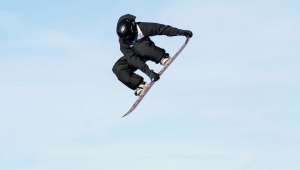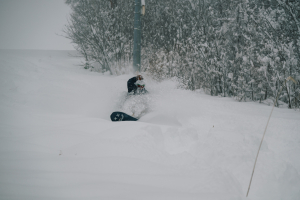Tuning Legends – The Men and Their Tuning Machines

Montana Crystal Glide system in Perisher
Tuning Legends | Don St. Pierre
Looking after your gear is critical to performance although not much talked about. So my last trip through the Snowy Mountains I took some time to speak with some of Australia’s ski & board tuning legends.
Remember the first time riding new gear, the smooth handling, acceleration and crisp finish you got out of each turn? Keeping up with regular tuning will help maintain that precision provided you’re up to it physically.
Even when the snow is abundant there are many impurities in it that diminishes the performance of a tuned base. From atmospheric fall-out including exhaust from snowmobiles and groomers we also deal with sticks, stones and a variety of debris which can’t always be seen never mind avoided. All of this constantly degrades the performance of your gear and does so slowly over the hours and days so you barely notice the extra effort you are putting in to compensate for the trashed bases and burred edges.
The good news is that with a bit of regular maintenance your gear will perform like new, accelerating, carving and holding even on sheet ice. And when you look at the investment made with accommodation, lift tickets, transport and on it goes, a few minutes of time along with the occasional full tune from a professional will greatly increase your stoke on the snow.
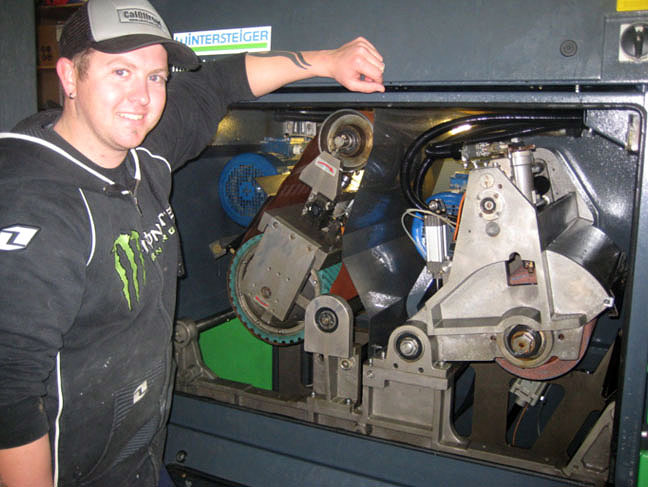
John Graham with his Wintersteiger
I first stopped in at Rhythm in Cooma and spoke with technician John Graham who operates a Wintersteiger Microjet Pro. John can do a complete full tune within 5 – 10 minutes. And while you wait you can see Kari Blyth upstairs for a coffee. A Rhythm tune cost about $50 – $60 which is competitive with many off snow service shops. We have to bare in mind that while this seems expensive the cost of these machines range around the $150,000 – $175,000. A speciality edger adds another $50,000 and the waxer about $3,000. Throw in regular maintenance at a minimum of several thousand every season along with basic overheads and you have to tune quite a few boards and skis just to cover costs.
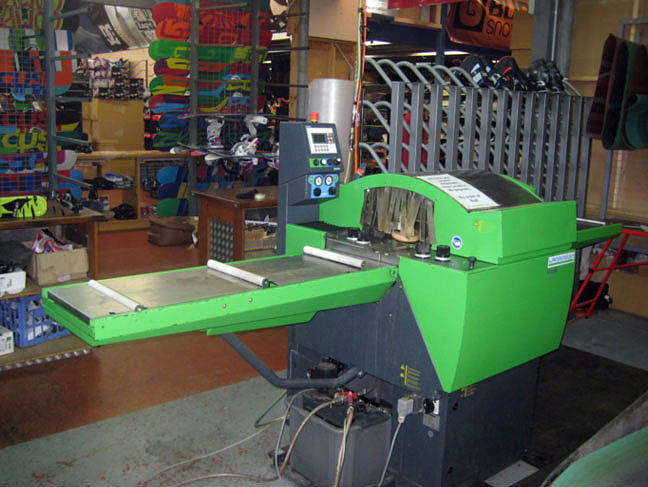
Wintersteiger Edger at Rhythm, Cooma
Moving on down the road to Jindabyne you’d have to consider stopping in at Jindabyne Sports, established in 1967 and one of Australia’s original snowsports stores. Currently owned and operated by Peter Clark since 1980 and along with chief tuner Daniel McIntyre, Jindy Sports takes great pride in their tuning skills.
Jindabyne Sports also use a Wintersteiger and with over 30 years experience will proficiently tune your gear while you wait or just drop it off and pick it up later. Tuning prices are again around the $60 mark depending on the amount of base work to be done.
Jindabyne’s largest rental shop would be Monster Sports (hence the name) with several outlets although their main service centre is located at Leesville, Jindabyne. The tuning miester is Allan West with 25 years experience making him renown in the industry. Allan is a passionate technician and given Monster has outlets at the Jindabyne Town Centre, Nuggets Crossing and the BP, Allan and his team can tune up to 100 pair of skis a day if needed. You can drop off your gear at any of these outlets and it’s ready first thing in the morning.
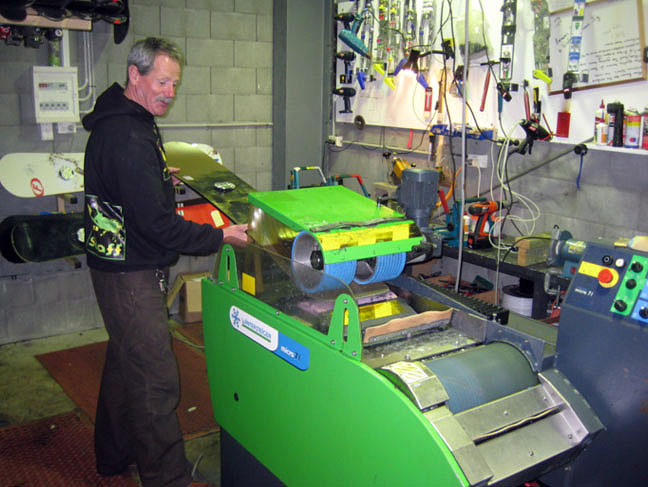
Allan West Of Monster Sports
Heading up to Perisher I spoke with Adi Mayer in the Perisher Centre. In 1972 Adi Mayer first arrived to Australia from Europe where he worked for Stroltz. What was to be a month holiday in Australia turned into 40 years and still going. Adi opened the Waxatorium in 1976 and in Adi’s experience the biggest revolution in ski tuning came in 1982 when the first stone grinders arrived on the scene. Compared to the old wet sanding technique the stone grinders are able to leave a factory finish with far more precision.
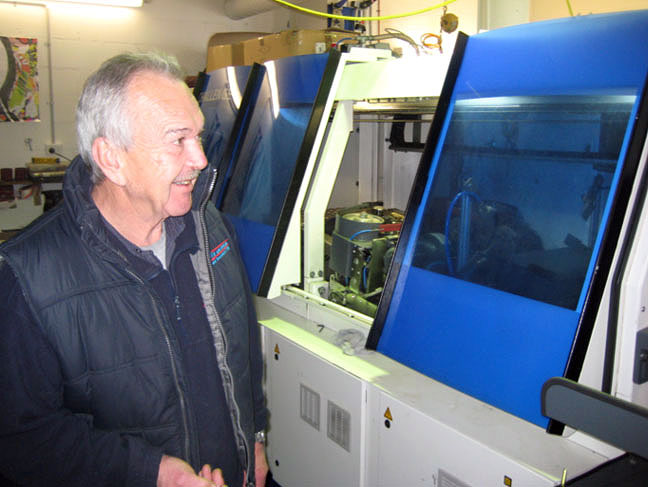
Adi Mayer with his Montana Crystal Glide system
Adi runs a clean machine and his Montana is a beauty with a wide grinding stone and edging system. The machine has the capacity to tune 40 pairs of skis per hour if required but Adi takes his time to guarantee perfection. Adi has well over $300,000 invested in his machines and as you can see in the photo below you could virtually eat off this equipment! A basic tune including stone grind, edges and wax is $55.00 and with base repair it goes up to $80.00.
Adi has the advantage of being located on the snow so it’s very convenient to stop in for a wax or tune and be back on your way after a coffee.
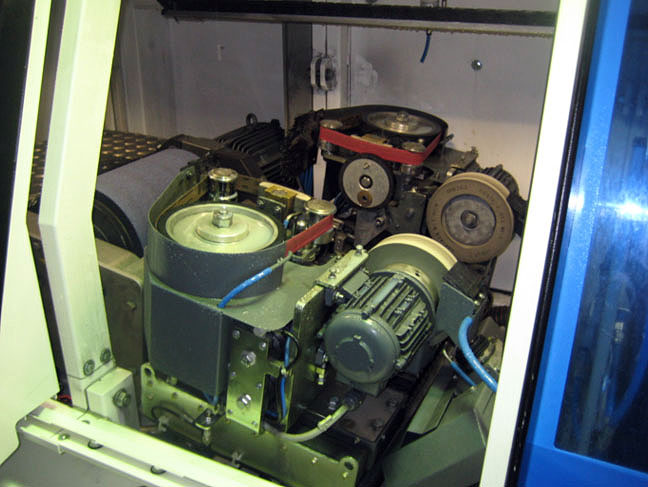
Adi’s Waxatorium
Adi also has a deep base-waxing machine that heats up the entire base and core of the ski or board to better absorb the wax for a longer lasting wax job. At $25.00 for a deep wax it will be guaranteed to run fast and last a long while.
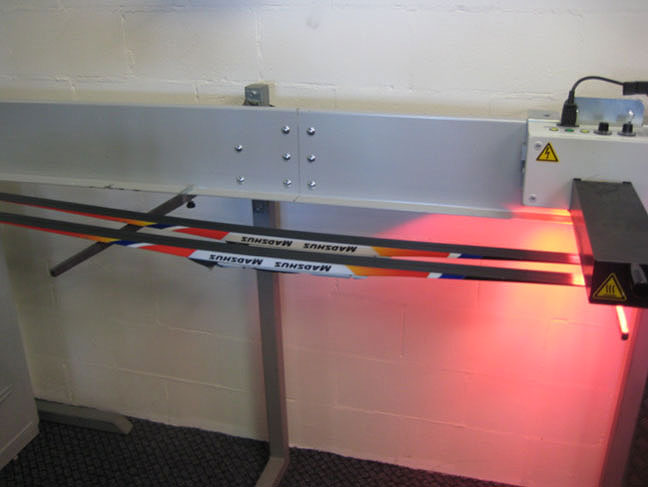
Adi’s Deep Base Waxing Machine
My final stop brought me across to Thredbo where I caught up with Ron Duncan of Ron Duncan’s Ski Repairs. Ron first opened his shop in 1972 using the old wet belt sanders available in those days but upgraded to a stone grinder as soon as they became available. Ron is going on 40 years in the business and like our other tuning legends he knows what he’s doing.
Like Adi, Ron also has the advantage of being located at the mountain base, his shop is at the bottom of Kosciusko Express in Thredbo making it very convenient to drop by and while Ron’s tuning your bases you can stop across the way at the Avalanche café for a coffee.
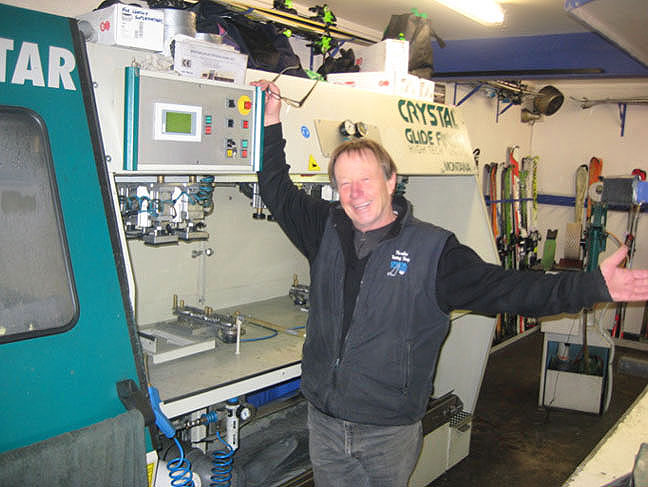
Ron Duncan with his Montana Crystal Glide at the base of the Kosciuszko Express Chair
Ron charges around $65.00 for a full tune and a bit more for any base repairs but well worth it when you consider the increased performance and enjoyment you’ll get out of truly tuned edges and bases. The structure these machines leave is second to none and can’t be replicated any other way. To see one of these machines in action watch below:
But never discount a bit of elbow grease. Using some basic equipment that I illustrate below.
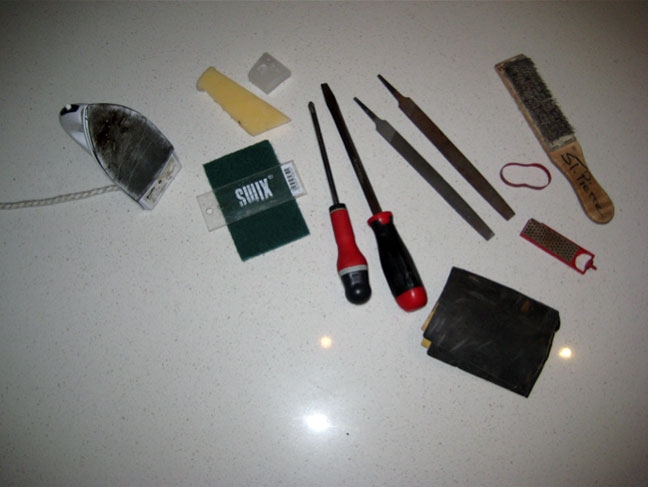
Basic kit; iron, wax, scraper, scotch brite buffer, file, file card, diamond stone, emery cloth, brake retention device or rubber band
A quick touch up will help keep your gear running smoother in between professional stone grind tune jobs. It doesn’t take much effort but makes all the difference maintaining carving and gliding properties. With a bit of practice you won’t require a bench and vices. Although a bench is nice it’s not necessary and lack of vices should never be used as an excuse not to keep you gear in good shape allowing us to get the most out of every turn.
Happy Tuning!

